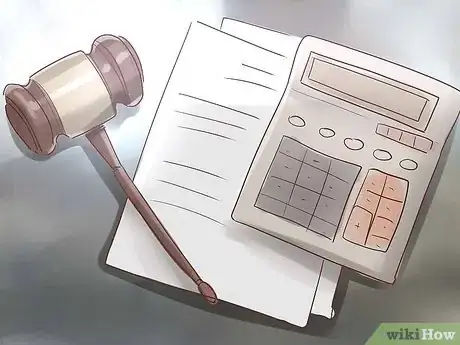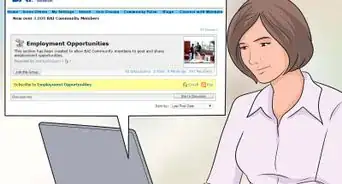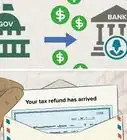This article was co-authored by Cassandra Lenfert, CPA, CFP®. Cassandra Lenfert is a Certified Public Accountant (CPA) and a Certified Financial Planner (CFP) in Colorado. She advises clients nationwide through her tax firm, Cassandra Lenfert, CPA, LLC. With over 15 years of tax, accounting, and personal finance experience, Cassandra specializes in working with individuals and small businesses on proactive tax planning to help them keep more money to reach their goals. She received her BA in Accounting from the University of Southern Indiana in 2006.
There are 8 references cited in this article, which can be found at the bottom of the page.
wikiHow marks an article as reader-approved once it receives enough positive feedback. This article received 23 testimonials and 96% of readers who voted found it helpful, earning it our reader-approved status.
This article has been viewed 323,248 times.
Becoming a tax preparer can offer rewarding and well-paying work. For example, the average tax preparer made about $68,090 in 2018.[1] You can make even more money if you do more detailed tax planning and resolution, such as if you become a certified public accountant (CPA) or tax attorney. In addition, tax preparers deal with a large cross-section of the public and, in many cases, are able to deliver good news of a large return or money found in previous years' returns to their clients. You'll also enjoy quite a bit of job security since people have to file taxes every year regardless of the state of the economy.[2] While it may seem like being a tax preparer would require a lot of education and training, almost anyone can become qualified in a number of months.
Steps
Meeting the Educational Requirements
-
1Meet the minimum requirements. In general, tax preparers are required to have a high-school diploma or equivalent. That is, you don't need a bachelor's or associate degree to get started or to thrive in the tax preparation industry. However, any aspiring tax preparer should be aware that the job will require some basic skills. You can prepare for the job in high school by cultivating:
- Strong math skills.
- Basic computer skills and typing ability.
- Customer service skill and experience.
- A very basic understanding of tax regulations (necessary forms and time constraints).[3]
-
2Take basic training courses. Because many tax preparers don't have any formal training in tax preparation, they must undergo a small amount of training before they can begin working. In these training courses, students learn about topics like filing status, taxpayer interviews, exemptions, tax calculations, and refund schedules.[4] These courses are offered by a number of sources, so it's best to consider several options before choosing the best one for your situation.
- Some tax preparation companies offer on-the-job training, so try applying for a job directly and see if they offer this type of training. This could save you a considerable amount of time and money. Find jobs by searching online job boards in November or December.[5]
- Sign up for a training program offered by the Accreditation Council for Accountancy and Taxation (ACAT) or National Association of Tax Professionals. See their websites for more information.
- Many technical and community colleges, as well as universities, offer short certificate programs that can qualify you for entry-level positions. Search for programs in your area to learn more. Some of these may also be available online.[6]
Advertisement -
3Complete additional tax training to increase your knowledge base. However you decide to get the training in, you'll have to complete it before becoming a tax professional. If you can, try to take advanced courses that include information on topics like estate taxes, capital gains, and retirement funds. This knowledge can separate you from the crowd.[7]
- Be sure to keep any notes or information you have from your classes, as you may need them later if you choose to pursue higher-level certifications or education.
- Also be sure that any tax preparation skills learned are tailored to the state in which you will be practicing, as filing requirements vary between states.[8]
-
4Earn a tax-related degree to get an edge over the competition. While a simple tax preparation course can prepare you for the majority of tax preparation roles, you may also want to reach higher by becoming a licensed tax accountant, a CPA, a tax attorney, or an IRS Enrolled Agent. Obviously, these will require much more education, and expense to you, but the opportunities for advancement and salary growth are much better. Without additional education (or owning your own tax preparation business), there is little room for advancement in the tax preparation industry.
- Tax preparers can become enrolled agents either by working for the IRS for a specified period of time or by passing the Special Enrollment Examination (SEE) and applying online for enrolled agent status. After passing the test or achieving the required work experience, you can apply for enrolled agent status by filling out IRS form 23 and undergoing a background check.[9]
Getting Certified
-
1Obtain a Preparer Tax Identification Number (PTIN). Before a tax preparer can begin work, they must also meet state and federal requirements. First, apply for a PTIN by submitting personal information (including your social security number) and a previous year's tax return. This can be done online at http://www.irs.gov. Getting a PTIN will register you as an "unenrolled preparer," granting you the minimum level of clearance to prepare federal taxes.[10]
- Note that this application will require to disclose and explain any felony convictions or problems with your tax obligations.[11]
-
2Register with your state. To become fully licensed, you will likely also have to register with your state. However, these requirements vary between states. Check your state's requirements by searching for "tax preparer registration for [your state]" online. In some cases, however, registration with the state is waived or not required under state law.[12]
-
3Become licensed, if necessary. CPAs and tax attorneys must obtain a license in the state they plan to work in. The education and experience requirements to sit for the licensing exam vary by state, so check with your state's board of accountancy for more information. When you've met the requirements, prepare and register for the exam. You must pass the exam in order to receive your license.[13]
Finding Work
-
1Work for a tax preparation service to gain experience. Many tax preparers begin their careers working for an established tax preparation service. These companies will train you in local and state requirements for tax filings and are able to help you through any difficulties you may have in the beginning. After gaining this experience, you are more prepared to move on to another job, start your own business, or further your education.[14]
- The biggest advantage of doing this type of work is that many tax preparers offer both free on-the-job training and free continuing education.[15]
- While this type of work is a great first start for a tax preparer, you may only be able to find work during tax season, which leaves you out of a job for about two-thirds of the year. This is great for part-timers, but if you want to be a tax preparer full time, you may want to seek other types of employment.
- There are many tax preparation services and CPA firms that are virtual, allowing you to work from home with flexible hours.
-
2Work for a law or accounting firm to handle more difficult tasks. In addition to specialized tax preparation companies, there may also be work available at law or accounting firms that offer tax services.[16] In these roles, you would likely be supporting a CPA or tax attorney in the preparation of tax returns for clients. In other words, you would be doing more than simply inputting your client's information—perhaps you'd also deal with certain tax accounting procedures or the intricacies of tax law.
- Finding this work can be easier if you are able to differentiate yourself from other tax preparers by specializing in a certain type of tax filing or business.[17] For example, perhaps you could specialize in filing a complex sort of taxes, like those on international assets.
- These opportunities may also be available at various other types of businesses, so be sure to search online job board and classified newspaper ads frequently for new opportunities.
-
3Start your own business if you're self-motivated. With enough accreditation or experience, you can start your own tax preparation business as an independent tax preparer. Start by advertising your services to the community and begin growing your customer base. With friendly and reliable service, you may soon find your business thriving and growing.[18] With time, you may even be able to open another franchise and hire other tax preparers to do the work for you!
- It may be a good idea to start with family and friends before moving on to other customers. This can help you get a low-stress start while you fine-tune your tax preparation process. From there, you can pass out business cards and rely on recommendations for more business.
- This will be your best choice if you want to work part-time as a tax preparer. It's easy to run a tax preparation business out of your home and undercut the prices of some of the bigger-name tax preparation services.[19]
- If you want additional work throughout the year, consider also offering services as a tax adviser or personal accountant to your tax preparation clients.[20]
Expert Q&A
Did you know you can get expert answers for this article?
Unlock expert answers by supporting wikiHow
-
QuestionWhere do I find free training to become a tax preparing agent?
 Cassandra Lenfert, CPA, CFP®Cassandra Lenfert is a Certified Public Accountant (CPA) and a Certified Financial Planner (CFP) in Colorado. She advises clients nationwide through her tax firm, Cassandra Lenfert, CPA, LLC. With over 15 years of tax, accounting, and personal finance experience, Cassandra specializes in working with individuals and small businesses on proactive tax planning to help them keep more money to reach their goals. She received her BA in Accounting from the University of Southern Indiana in 2006.
Cassandra Lenfert, CPA, CFP®Cassandra Lenfert is a Certified Public Accountant (CPA) and a Certified Financial Planner (CFP) in Colorado. She advises clients nationwide through her tax firm, Cassandra Lenfert, CPA, LLC. With over 15 years of tax, accounting, and personal finance experience, Cassandra specializes in working with individuals and small businesses on proactive tax planning to help them keep more money to reach their goals. She received her BA in Accounting from the University of Southern Indiana in 2006.
Financial Advisor & Certified Public Accountant
-
QuestionCan I be a tax preparer without a high school diploma?
 Cassandra Lenfert, CPA, CFP®Cassandra Lenfert is a Certified Public Accountant (CPA) and a Certified Financial Planner (CFP) in Colorado. She advises clients nationwide through her tax firm, Cassandra Lenfert, CPA, LLC. With over 15 years of tax, accounting, and personal finance experience, Cassandra specializes in working with individuals and small businesses on proactive tax planning to help them keep more money to reach their goals. She received her BA in Accounting from the University of Southern Indiana in 2006.
Cassandra Lenfert, CPA, CFP®Cassandra Lenfert is a Certified Public Accountant (CPA) and a Certified Financial Planner (CFP) in Colorado. She advises clients nationwide through her tax firm, Cassandra Lenfert, CPA, LLC. With over 15 years of tax, accounting, and personal finance experience, Cassandra specializes in working with individuals and small businesses on proactive tax planning to help them keep more money to reach their goals. She received her BA in Accounting from the University of Southern Indiana in 2006.
Financial Advisor & Certified Public Accountant
Warnings
- Unless you seek further education (as an enrolled agent or tax accountant), you may only be able to find work during the January-April tax season.⧼thumbs_response⧽
- Tax preparers often don't receive benefits due to the seasonal nature of their work.⧼thumbs_response⧽
- The job can be stressful, as any mistake made could cost the client a lot of money. Also, client stress can be contagious.⧼thumbs_response⧽
- Computer automation may make human tax preparers obsolete, so the long-term career prospects of a tax preparer are up in the air. However, you can use your knowledge to work in other areas like tax or financial planning, if necessary.⧼thumbs_response⧽
- It's essential to stay up-to-date on changes to the tax law each year, especially because the federal tax code is quite complicated.⧼thumbs_response⧽
References
- ↑ https://www.bls.gov/oes/current/oes132082.htm
- ↑ http://learn.org/articles/Tax_Preparer_5_Steps_to_Becoming_a_Tax_Preparer.html
- ↑ http://learn.org/articles/Tax_Preparer_5_Steps_to_Becoming_a_Tax_Preparer.html
- ↑ http://study.com/articles/Tax_Preparer_Educational_Requirements_to_be_a_Tax_Accounting_Professional.html
- ↑ http://study.com/articles/Tax_Preparer_Educational_Requirements_to_be_a_Tax_Accounting_Professional.html
- ↑ http://study.com/articles/Tax_Preparer_Educational_Requirements_to_be_a_Tax_Accounting_Professional.html
- ↑ http://study.com/articles/Tax_Preparer_Educational_Requirements_to_be_a_Tax_Accounting_Professional.html
- ↑ http://www.howtobecome.com/how-to-become-a-tax-preparer
- ↑ http://www.naea.org/become-enrolled-agent/how-do-you-become-enrolled-agent
- ↑ http://www.howtobecome.com/how-to-become-a-tax-preparer
- ↑ http://www.howtobecome.com/how-to-become-a-tax-preparer
- ↑ http://www.howtobecome.com/how-to-become-a-tax-preparer
- ↑ https://nasba.org/licensure/gettingacpalicense/howtogetlicensed/
- ↑ http://learn.org/articles/Tax_Preparer_5_Steps_to_Becoming_a_Tax_Preparer.html
- ↑ http://learn.org/articles/Tax_Preparer_5_Steps_to_Becoming_a_Tax_Preparer.html
- ↑ http://www.howtobecome.com/how-to-become-a-tax-preparer
- ↑ http://www.accountingweb.com/tax/irs/tax-season-may-be-opportune-time-to-market-tax-preparation-services
- ↑ http://www.howtobecome.com/how-to-become-a-tax-preparer
- ↑ https://www.mainstreet.com/article/7-best-part-time-jobs
- ↑ https://www.mainstreet.com/article/7-best-part-time-jobs
- ↑ http://study.com/articles/Tax_Preparer_Educational_Requirements_to_be_a_Tax_Accounting_Professional.html
About This Article
To become a tax preparer, apply for jobs that offer tax preparer training or enroll in a training program offered by the Accreditation Council for Accountancy and Taxation. After training, obtain a Preparer Tax Identification Number using the IRS website. Then, to become certified, register with your state by searching "tax preparer registration" and the name of your state. Once you are certified, you can work for a tax preparation company or start your own business. To learn more about tax training and higher education options, keep reading.







































































